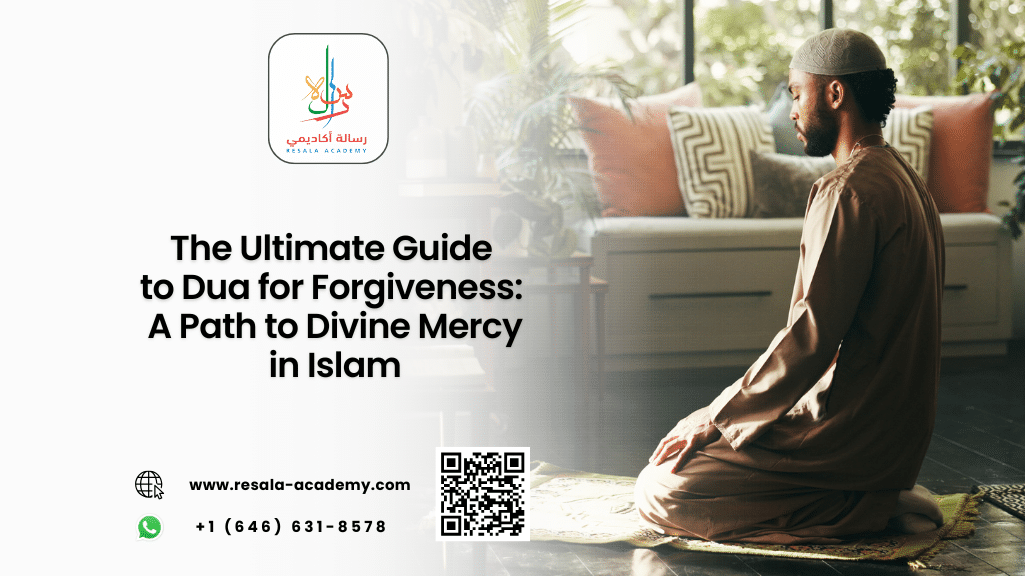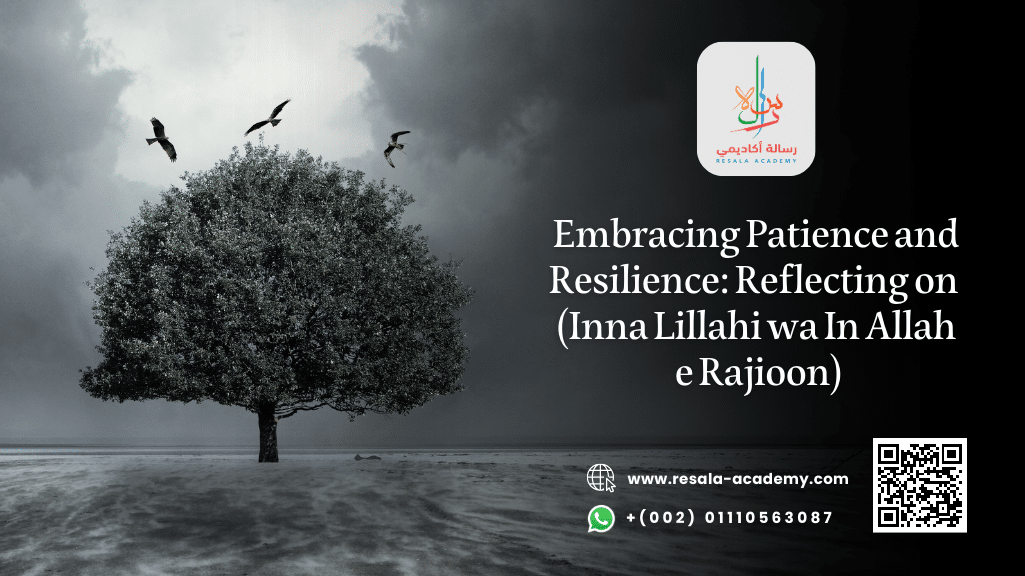Table of Contents
The Ultimate Guide to Dua for Forgiveness: A Path to Divine Mercy in Islam
Seeking forgiveness is a cornerstone of Islamic spirituality. Whether you’re a lifelong Muslim or a new learner exploring the beauty of Islam, understanding the power and depth of a dua for forgiveness can transform your relationship with Allah ﷻ.
In this comprehensive guide, we delve into the most powerful supplications for forgiveness, their roots in the Quran and Hadith, and how non-native speakers can master these duas with the help of institutions like Resala Academy, a leading online platform for Arabic and Quranic studies.
What is Dua for Forgiveness?
In Islam, a dua for forgiveness is a heartfelt supplication made to Allah ﷻ, asking for pardon from sins, mistakes, and shortcomings. It is an act of humility, recognizing our human imperfection and Allah’s infinite mercy.
The Arabic term for forgiveness is “Istighfar” (ٱسْتِغْفَار), which literally means “seeking forgiveness.” The Prophet Muhammad ﷺ emphasized the importance of seeking forgiveness regularly, even though he was sinless.
قَالَ أَبُو هُرَيْرَةَ سَمِعْتُ رَسُولَ اللَّهِ صلى الله عليه وسلم يَقُولُ “ وَاللَّهِ إِنِّي لأَسْتَغْفِرُ اللَّهَ وَأَتُوبُ إِلَيْهِ فِي الْيَوْمِ أَكْثَرَ مِنْ سَبْعِينَ مَرَّةً ”.
Narrated Abu Huraira: I heard Allah’s Messenger (ﷺ) saying.” By Allah! I ask for forgiveness from Allah and turn to Him in repentance more than seventy times a day.”
Why Is Seeking Forgiveness So Important in Islam?
Forgiveness is not just a spiritual act—it’s a means of cleansing the soul, earning Allah’s mercy, and opening the doors to blessings in this life and the Hereafter.
Benefits of Reciting Duas for Forgiveness:
- Spiritual purification
- Removal of hardships and sins
- Increase in sustenance and blessings
- Peace of mind and heart
- Closeness to Allah ﷻ
وَقُل رَّبِّ ٱغْفِرْ وَٱرْحَمْ وَأَنتَ خَيْرُ ٱلرَّٰحِمِينَ
“Say, ˹O Prophet,˺ “My Lord! Forgive and have mercy, for You are the best of those who show mercy.”
— Read Full Verse
Quranic Duas for Forgiveness
The Quran is filled with beautiful supplications made by Prophets and believers seeking forgiveness. These are not only powerful but also serve as models for our own duas.
1. Dua of Prophet Adam (AS)
قَالَا رَبَّنَا ظَلَمْنَآ أَنفُسَنَا وَإِن لَّمْ تَغْفِرْ لَنَا وَتَرْحَمْنَا لَنَكُونَنَّ مِنَ ٱلْخَـٰسِرِينَ They replied, “Our Lord! We have wronged ourselves. If You do not forgive us and have mercy on us, we will certainly be losers.”
— Surah Al-A’raf 7:23
2. Dua of Prophet Nuh (AS)
رَّبِّ ٱغْفِرْ لِى وَلِوَٰلِدَىَّ وَلِمَن دَخَلَ بَيْتِىَ مُؤْمِنًۭا وَلِلْمُؤْمِنِينَ وَٱلْمُؤْمِنَـٰتِ وَلَا تَزِدِ ٱلظَّـٰلِمِينَ إِلَّا تَبَارًۢا
“My Lord! Forgive me, my parents, and whoever enters my house in faith, and ˹all˺ believing men and women. And increase the wrongdoers only in destruction.”
— Surah Nuh 71:28
3. Dua of Prophet Yunus (AS)
وَذَا ٱلنُّونِ إِذ ذَّهَبَ مُغَـٰضِبًۭا فَظَنَّ أَن لَّن نَّقْدِرَ عَلَيْهِ فَنَادَىٰ فِى ٱلظُّلُمَـٰتِ أَن لَّآ إِلَـٰهَ إِلَّآ أَنتَ سُبْحَـٰنَكَ إِنِّى كُنتُ مِنَ ٱلظَّـٰلِمِينَ
And ˹remember˺ when the Man of the Whale stormed off ˹from his city˺ in a rage, thinking We would not restrain him.1 Then in the ˹veils of˺ darkness2 he cried out, “There is no god ˹worthy of worship˺ except You. Glory be to You! I have certainly done wrong.”
— Surah Al-Anbiya 21:87
Duas for Forgiveness from Hadith
The Prophet Muhammad ﷺ taught many duas for forgiveness that are concise yet immensely powerful.
1. Sayyidul Istighfar – The Master Supplication for Forgiveness
عَنِ النَّبِيِّ صلى الله عليه وسلم ” سَيِّدُ الاِسْتِغْفَارِ أَنْ تَقُولَ اللَّهُمَّ أَنْتَ رَبِّي، لاَ إِلَهَ إِلاَّ أَنْتَ، خَلَقْتَنِي وَأَنَا عَبْدُكَ، وَأَنَا عَلَى عَهْدِكَ وَوَعْدِكَ مَا اسْتَطَعْتُ، أَعُوذُ بِكَ مِنْ شَرِّ مَا صَنَعْتُ، أَبُوءُ لَكَ بِنِعْمَتِكَ عَلَىَّ وَأَبُوءُ لَكَ بِذَنْبِي، فَاغْفِرْ لِي، فَإِنَّهُ لاَ يَغْفِرُ الذُّنُوبَ إِلاَّ أَنْتَ ”.
The Prophet (ﷺ) said “The most superior way of asking for forgiveness from Allah is: O Allah, You are my Lord, there is none worthy of worship except You. You have created me, and I am Your servant, and I am faithful to Your covenant and promise as much as I can. I seek refuge in You from the evil of what I have done. I acknowledge Your blessings upon me, and I admit my sins. So forgive me, for none forgives sins except You.
(Allahumma anta Rabbi la ilaha illa anta, Khalaqtani wa ana `Abduka, wa ana `ala `ahdika wa wa`dika mastata`tu, A`udhu bika min Sharri ma sana`tu, abu’u Laka bini`matika `alaiya, wa abu’u laka bidhanbi faghfir lee fa innahu la yaghfiru adhdhunuba illa anta) “
This dua is known as the best dua for forgiveness in Islam, and whoever recites it in the morning and dies before evening will enter Paradise.
2. Short but Powerful Dua
أَسْتَغْفِرُ اللَّهَ
“I seek forgiveness from Allah.”
This simple phrase, repeated often, is a gateway to Allah’s mercy.
Read more about: The Ultimate Guide to Dua for Sleeping: Islamic Supplications for Peaceful Rest
Best Times to Make Dua for Forgiveness
Timing enhances the spiritual impact of your supplication. Here are the most effective times to seek Allah’s forgiveness:
🌌 Last third of the night (Tahajjud time)
🕌 After obligatory prayers
📿 During sujood (prostration)
🕋 On Fridays and during Ramadan
🌙 In the last 10 nights of Ramadan, especially Laylatul Qadr
وَبِٱلْأَسْحَارِ هُمْ يَسْتَغْفِرُونَ
“And in the hours before dawn, they would ask forgiveness.”
— Surah Adh-Dhariyat 51:18
Exploring the Psychological and Spiritual Benefits of Reciting a Dua for Forgiveness
Emotional Healing Through Supplication: Regular recitation of a dua for forgiveness fosters emotional resilience by allowing individuals to release guilt and shame, promoting inner peace and self-acceptance. The act of turning to Allah in humility has been shown to reduce anxiety and depressive symptoms in believers.
Strengthening the Connection with the Divine: Engaging in heartfelt pleas such as Astaghfirullah or Rabbighfir li not only cleanses the soul but also deepens the believer’s relationship with Allah. This spiritual intimacy reinforces the concept of tawbah (repentance) and encourages consistent self-reflection.
Boosting Mental Clarity and Focus: The meditative repetition of phrases like “Allahumma innaka ‘afuwwun tuhibbul ‘afwa fa’fu ‘anni” helps in centering the mind, reducing mental clutter, and enhancing mindfulness—an essential practice in both Islamic spirituality and modern psychology.
Creating a Habit of Accountability: Incorporating daily duas for repentance into one’s routine instills a sense of moral responsibility. This habit encourages believers to evaluate their actions regularly and seek continuous self-improvement.
Integrating Dua for Forgiveness into Daily Islamic Practices
Incorporation into Salah (Prayer): After each of the five daily prayers, Muslims are encouraged to recite “Astaghfirullah” three times. This simple yet profound act embeds the dua for forgiveness into the rhythm of daily worship, reinforcing humility and gratitude.
Utilizing the Last Third of the Night (Tahajjud): The final portion of the night is considered the most spiritually potent time to seek Allah’s mercy. Reciting duas for mercy and forgiveness during Tahajjud aligns with prophetic traditions and maximizes the likelihood of acceptance.
Post-Sin Reflection and Immediate Supplication: Promptly turning to Allah after committing a sin with a sincere dua for repentance and forgiveness helps prevent spiritual stagnation. This immediate response fosters a proactive approach to spiritual growth.
Teaching Children the Importance of Istighfar: Introducing young Muslims to simple phrases like “Astaghfirullah Rabbi min kulli dhambin wa atubu ilayh” nurtures a lifelong habit of seeking forgiveness. This early education reinforces the merciful nature of Allah and the value of accountability.
Linking Forgiveness with Gratitude Practices: Combining duas for forgiveness with expressions of shukr (gratitude) creates a balanced spiritual mindset. Recognizing one’s shortcomings while appreciating Allah’s blessings cultivates a holistic approach to faith and self-awareness.
How Non-Native Speakers Can Learn Duas for Forgiveness
For non-native Arabic speakers, learning duas for forgiveness can be challenging. That’s where Resala Academy comes in.
Why Choose Resala Academy?
📚 Expert Arabic and Quran teachers
🌍 Tailored for non-native speakers
🎓 Structured online courses
📖 Focus on Tajweed, Quran memorization, and Islamic studies
💬 Interactive and engaging learning environment
Whether you’re a beginner or advanced learner, Resala Academy offers personalized guidance to help you master Arabic and understand the Quran deeply.
How to Make Dua for Forgiveness Effectively
Making dua for forgiveness is not just about words—it’s about sincerity, humility, and connection with Allah ﷻ.
Steps to Follow:
- Begin with Praise: Start your dua by praising Allah and sending blessings on the Prophet ﷺ.
- Acknowledge Your Mistakes: Admit your sins openly and sincerely.
- Ask for Forgiveness: Use the duas mentioned above or speak from your heart.
- Make a Commitment: Promise not to return to the sin.
- Be Consistent: Repeat your dua regularly, especially during the best times.
Top 5 Duas for Forgiveness Every Muslim Should Know
Here’s a quick list of essential duas for forgiveness:
- Sayyidul Istighfar – The most comprehensive dua
- Astaghfirullah – Simple and powerful
- Dua of Prophet Yunus (AS) – For urgent forgiveness
- Dua of Prophet Adam (AS) – For regret and mercy
- اللَّهُمَّ اغْفِرْ لِي – “O Allah, forgive me”
Resala Academy: Your Journey to Spiritual Enlightenment Starts Here!
If you’re inspired to learn more about dua for forgiveness in Islam, improve your Arabic, and understand the Quran like never before, Resala Academy is your gateway.
With expert instructors, flexible online classes, and a curriculum tailored for non-native speakers, Resala Academy helps you:
🧠 Learn Arabic from scratch or enhance your fluency
📖 Understand the Quran with Tafsir and Tajweed
🕋 Deepen your connection with Islamic teachings
💬 Practice daily duas and supplications with accuracy
👉 Join Resala Academy today and take the first step toward mastering the language of the Quran and the art of supplication.
Frequently Asked Questions (FAQs)
1. What is the best dua for forgiveness in Islam?
The best dua for forgiveness is known as Sayyidul Istighfar:
اللَّهُمَّ أَنْتَ رَبِّي لَا إِلَهَ إِلَّا أَنْتَ…
Whoever recites this in the morning and dies before evening, or in the evening and dies before morning, will enter Paradise.
Sahih al-Bukhari 6306
2. How often should I say Astaghfirullah?
You can say Astaghfirullah as often as possible. The Prophet ﷺ used to say it more than 70 times a day. It’s a simple yet powerful way to seek forgiveness throughout your day.
3. Can I make dua in my own language?
Yes, especially outside of salah. While Arabic is preferred in formal prayers, making dua in your native language is completely acceptable and encouraged for deeper emotional connection.
4. How can I memorize duas if I don’t speak Arabic?
Enroll in an academy like Resala Academy that specializes in teaching Arabic and Quran to non-native speakers. They provide audio, visual, and interactive tools to help you memorize and understand the meaning of each dua.
5. Does Allah forgive all sins?
Yes, Allah ﷻ forgives all sins for those who sincerely repent.
قُلْ يَـٰعِبَادِىَ ٱلَّذِينَ أَسْرَفُوا۟ عَلَىٰٓ أَنفُسِهِمْ لَا تَقْنَطُوا۟ مِن رَّحْمَةِ ٱللَّهِ ۚ إِنَّ ٱللَّهَ يَغْفِرُ ٱلذُّنُوبَ جَمِيعًا ۚ إِنَّهُۥ هُوَ ٱلْغَفُورُ ٱلرَّحِيمُ
“Say, ‘O My servants who have transgressed against themselves [by sinning], do not despair of the mercy of Allah. Indeed, Allah forgives all sins.’”
— Surah Az-Zumar 39:53
Conclusion
The journey of seeking forgiveness is one of the most beautiful paths in Islam. It brings peace, clarity, and a renewed connection with your Creator. Whether you’re reciting a simple dua for forgiveness or learning the eloquent supplications from the Quran and Hadith, remember that Allah’s mercy is always near.
And if you’re a non-native speaker eager to learn Arabic, understand the Quran, and perfect your duas, Resala Academy is your trusted companion on this spiritual journey.
Start your journey with Resala Academy today and experience the transformative power of knowledge, language, and faith. Enroll Now




